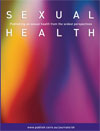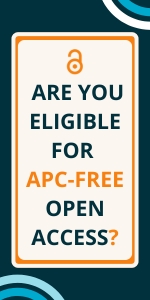
Sexual Health
Volume 18 Number 5 2021
SH21079Outcomes of routine screening for reproductive coercion in a family planning service
 , Eleanor G. Wilson, Jessica R. Botfield
, Eleanor G. Wilson, Jessica R. Botfield  , Clare J. Boerma, Jane Estoesta, Leslie James Peters and Kevin McGeechan
, Clare J. Boerma, Jane Estoesta, Leslie James Peters and Kevin McGeechan
The National Women’s Health Strategy (2020–2030) considers ‘reduction in the rate of reproductive coercion’, a key measure of success in improving health for women. Our study reviews the outcomes of reproductive coercion (RC) screening in a family planning service. Findings indicate RC was more likely to be disclosed among clients who were unemployed, had a disability or had multiple visits. Clinicians conducting RC screening must have adequate training and resources to both screen and respond to women who disclose RC.
SH20227Sexual function in reproductive-aged women following radiotherapy: a cross sectional study
The importance that sexual health plays in the quality of life of reproductive-aged women following radiation therapy has been largely unexplored in the literature. Our findings illustrated that most domains of sexual function are negatively affected in our study population. This information can assist with counselling patients regarding survivorship issues, within the broader context of management options.
Changes in sexual behaviour and satisfaction as a result of COVID-19 vary along the lines of partnership status and living arrangements. Participants who were single or not living with their partners experienced a decrease in partnered sexual activities, but an increase in individual sexual behaviours. Those who were not living with their partners were more likely to experience a decrease in sexual satisfaction, whereas those who were living with their partners were less likely, relative to those who were single.
SH21077 Abstract | SH21077 Full Text | SH21077PDF (1.5 MB) | SH21077Supplementary Material (486 KB) Open Access Article
SH21024Resourcefulness of homeless young people who practise sex work in Pakistan: a qualitative study
Homeless young people are often thought about and discussed in terms of moral, physical, and mental deficits, and as incapable of helping themselves. Our study offers an alternative and a more positive perspective. It highlights the ways that homeless young people in Pakistan survive by engaging in erotic dancing and sex work and how they minimise their risks using novel skills and resources available to them on the streets.
SH21024 Abstract | SH21024 Full Text | SH21024PDF (302 KB) Open Access Article
SH21123Barriers and facilitators to engagement with artificial intelligence (AI)-based chatbots for sexual and reproductive health advice: a qualitative analysis
 , Vannesa Puentes, Izabela Pawlak, Tania Mendes, Ian Montgomery, Jake Bayley and Damien Ridge
, Vannesa Puentes, Izabela Pawlak, Tania Mendes, Ian Montgomery, Jake Bayley and Damien Ridge 
This study demonstrates that chatbots may be suitable for anonymous sex education, providing professional information about sexually transmitted infections in an interactive way and signposting users to relevant healthcare services. However, several concerns about chatbot accuracy, trust in automated responses, limited content and the lack of empathy may compromise engagement with this technology. Future research needs to provide evidence on sexual health chatbot effectiveness and impact on healthcare services such as the uptake of screening.
SH21123 Abstract | SH21123 Full Text | SH21123PDF (211 KB) Open Access Article
Young people disproportionately experience poor sexual health outcomes so need easy access to quality sexual health care. High levels of unmet need for sexual health care were reported in this survey due to embarrassment, fears about judgment and confidentiality, and lack of knowledge about where to go. Action is needed at policy, funding and practice levels to reduce societal stigma, improve awareness of services and to ensure young people are treated with kindness, empathy and respect when presenting for sexual health care.
SH21101STI testing among young people attending music festivals in New South Wales, Australia: exploring the client segmentation concept in the ‘Down to Test’ program
 , Carolyn Murray, Margy Ewing, Heng Lu, Christopher Bourne and Limin Mao
, Carolyn Murray, Margy Ewing, Heng Lu, Christopher Bourne and Limin Mao
A social marketing intervention targeting young people attending music festivals in NSW Australia enables STI screening embedded in a service mix prioritised positive youth engagement in health seeking.
SH21101 Abstract | SH21101 Full Text | SH21101PDF (208 KB) Open Access Article
Increasing microbial resistance patterns have prompted clinician concerns regarding presumptive antibiotic treatments. To determine the accuracy of presumptive chlamydia treatment practices at a regional walk-in-centre, we audited all same-day screen and treat patients over 6 months. Findings revealed 25% were positive for chlamydia indicating over-treatment and raising concerns about antimicrobial stewardship. Practices were modified to provide more precise clinical care, while balancing wider the objectives of antimicrobial stewardship.
SH21110Social media’s role in support networks among LGBTQ adolescents: a qualitative study
 , Melody Taba
, Melody Taba  , Jennifer L. Marino
, Jennifer L. Marino  , Megan S. C. Lim
, Megan S. C. Lim  , Spring Chenoa Cooper, Larissa Lewis
, Spring Chenoa Cooper, Larissa Lewis  , Kath Albury
, Kath Albury  , Kon Shing Kenneth Chung
, Kon Shing Kenneth Chung  , Deborah Bateson
, Deborah Bateson  and S. Rachel Skinner
and S. Rachel Skinner 
Lesbian, gay, bisexual, transgender, queer and/or questioning (LGBTQ) youth are at higher risk of mental health concerns. This study explores how LGBTQ adolescents use social media for social wellbeing support, connect with other LGBTQ peers, and seek support. Participants utilised LGBTQ Facebook groups to provide and seek social support, which was considered useful for those feeling isolated or victimised. However, some participants noted negative experiences (e.g. discrimination) within larger Facebook groups.
SH21110 Abstract | SH21110 Full Text | SH21110PDF (420 KB) | SH21110Corrigendum (420 KB) Open Access Article
Sydney Sexual Health Centre, the largest public sexual health clinic in New South Wales, created an online triage tool to ensure access for consumers from priority populations and refer those from non-priority populations to a more appropriate service. A 2017 review of this triage tool found that it had achieved its purpose in triaging out non-priority populations. It saved a significant amount (approximately 6 months equivalent) of phone triage nurse time previously spent directing patients to other services. More work may need to be done to ensure that the tool is not creating a barrier for priority populations wishing to access our service.
Clinicians working with patients of reproductive age have an important role to play in recognising and responding to reproductive coercion and abuse, but they are often unaware of what it is and how to respond effectively to disclosures. In this Letter, we provide an overview of the issue and how health professionals can identify and support affected families, as well as considerations for future research.
Little is known about the risk of unintended pregnancy among transgender and non-binary (TNB) people. Using cross-sectional, national data, we show that TNB college students are as likely to have an unintended pregnancy as their cisgender peers, and that TNB students are interested in receiving pregnancy prevention information. These findings indicate that TNB young people need access to comprehensive reproductive health counselling and care.
SH21110_COCorrigendum to: Social media’s role in support networks among LGBTQ adolescents: a qualitative study
SH21110_CO Abstract | SH21110_COCorrigendum (420 KB) Open Access Article



